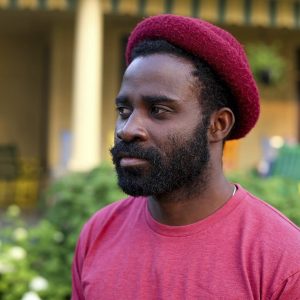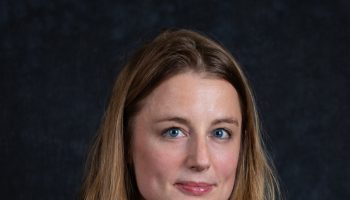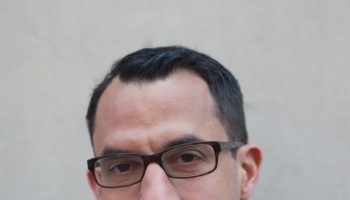
When Sony Ton-Aime writes poetry, he is devoted to the stanza’s literal definition. In its original Italian, stanza means “room” — a concept that is, for the Wick Poetry fellow, evocative of home and the physical and emotional “pockets of time” he encounters as a person adrift between cultures. His apartment at the Literary Arts Center at Alumni Hall is a home, but so too are flashes of joy or hollows of sorrow.
“I build little rooms in my happiness and furnish them with the same appliances that I use for my rooms in sadness,” Ton-Aime said. “This way, I try to trick my mind to think they are the same room. To be alive is, for me, to be conscious of these moments and navigate through them.”
And so, flexing this same spirit of industriousness inside of his stanzas, he does everything he might do inside the walls of his room: sit, lie down and — especially — dance.
“Barely able” to sustain a two-minute conversation in English, Ton-Aime arrived at Kent State University in 2010, in pursuit of a degree that required the least amount of English proficiency. Although he quickly realized that Haiti’s French education system had trained him in language, he majored in accounting and earned honors, leaving room in his course load for a poetry class and an internship with the Wick Poetry Center. After graduation, while he was away for a two-year accounting stint in Haiti, his first poems were published in the United States.
Nine years later, he is a published poet nearing the end of his second season at Chautauqua Institution, a summer crowded with acting as a liaison for writers-in-residence at the Chautauqua Writers’ Center, mentoring undergraduate literary arts interns and managing his alma mater’s interactive Traveling Stanzas exhibit in the Hultquist Center’s Poetry Makerspace.
At 12:15 p.m. Thursday, August 8 on the porch of Alumni Hall, he will read poems from his chapbook LaWomann, and from new work, during the Chautauqua Literary Arts Friends weekly Authors’ Hour. Chautauqua author Carol Townsend — an associate professor of art and design, award-winning ceramicist and mixed-media artist and former chair of the Design Department at the State University College of New York — will read from her chapbook, The Color of Shadows.
Ton-Aime borrows the title of his chapbook from the “personae” that populate his book-length MFA thesis, Matriphagy. A collection of nearly 90 poems, the manuscript was inspired in part by the work of Natasha Trethewey and Week Five poet-in-residence Shara McCallum — two poets who currently sit “on the top” of Ton-Aime’s list of favorites. At 21 poems, LaWomann is slimmer than Matriphagy. Its completion was punctuated by a book launch in Pittsburgh on April 19, 2019, a day Ton-Aime remembers as “terrific.”
“When I finally held this little thing in my hands and saw my name on it, I was jubilant,” Ton-Aime said. “(But) the poems are very different to me now. I realize that poets are like children. The moment they have new toys, they can’t stand the old ones. Now, every time I read my old poems, I can’t help myself from thinking about the ones I am writing now.”
His creative process boasts no regimented schedule, mostly because he can’t afford to prescribe to one, and also because he lacks any static sources of inspiration. Fortunately, everything — a song, someone’s handwriting, a call to family in Haiti — can trigger a poem in him; he relies on these imaginative glimmers to lead him.
“I am at their mercy,” he said.
For the past year, Ton-Aime’s paradoxical relationship to language has been the driving force behind his writing — his “enemy” and his “armor.”
“I speak four languages, yet still I claim none,” he said. “Three of them are foreign to my people. They are imposed languages. The only one, Haitian Creole, that I could claim (has) slipped away from me. I speak Haitian Creole now like a diaspora, as my parents say contemptuously when I speak my corrupted Creole over the phone. And since language is the basis for our identity, I am a man with no roots; thus, why I am a nomad.”
Instead of playing with poetic devices to emphasize lines or ideas, he employs caesurae and anaphora in order “to signal” the translation mechanism of a “foreigner’s brain.” Ton-Aime builds a room of his own with language, inviting others to dance with him.
“More and more, I have been meeting people who, like me, are caught in between two or three languages and feel lost,” he said. “So I am working to develop a new language, or at least a new linguistic register, through the mediums of poetry and storytelling, that will not only bridge cultures, but give a sense of belonging to the people who find themselves floating between them.”





